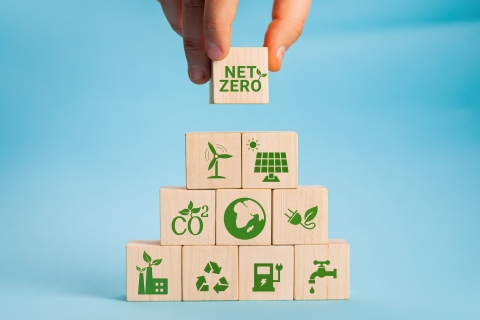Earth Day 2023: What the Events Industry Is Doing to Achieve Net Zero Carbon Events by 2050

As the world gets ready to celebrate Earth Day on April 22, Trade Show News Network (TSNN) caught up with the Joint Meetings Industry Council (JMIC) Executive Director Alexander Alles to find out the latest on Net Zero Carbon Events (NZCE), an initiative to connect the events industry globally to the rapidly growing movement toward net zero by 2050. Alles was appointed to the newly created position in August 2022 to oversee the initiative as part of his duties.
 When was the initiative launched?
When was the initiative launched?
In Nov. 2021, world leaders met in Glasgow, Scotland, at COP26 to present how their countries will achieve the 50% reduction in carbon emissions by 2030 to deliver on the Paris Agreement. At this meeting, the Net Zero Carbon Events Pledge was launched with more than 100 first signatories, setting out the events industry’s commitment to play its role in addressing climate change.
What is the goal of NZCE?
To get industry organizations to commit to support the goal of net zero greenhouse gas (GHG) emissions by 2050, in line with global efforts set out by the U.N. Paris Agreement to limit warming to 1.5°C and reduce total global GHG emissions by 50% by 2030, and to actively promote and advocate for industry efforts throughout the value chain. The initiative aims to:
- Activate the entire ecosystem to move toward net zero in time
- Get ahead of the process of regulation and legislation
- Find a common methodology for measuring the carbon footprint of events
- Become a role model for all industries whose events, exhibitions or congresses the MICE industry is organizing
What are the key accomplishments so far for NZCE?
Several important milestones were achieved throughout the course of the project development:
- In 2021, an organizing task force initiated by JMIC members began preparation work on the pledge, published and acquired signatories, and made initial contact with the United Nations Framework Convention on Climate Change (UNFCCC).
- NZCE launched its Pledge, which was officially endorsed by UNFCCC at the U.N. COP26 in Glasgow in November. 2021.
- In 2022, we worked on a roadmap toward the achievement of net-zero with a growing group of interested parties; called for signatories and supporters; launched a funding scheme; and organized several open online webinars to inform and invite all players from the entire ecosystem.
- In November 2022, we participated in the U.N. COP27 in Sharm El Skeikh, Egypt, and released the roadmap toward net zero for the meetings and events industry. Read the full Roadmap Report.
How many organizations support the initiative?
As of April 2023, NZCE is supported by more than 500 organizations based in 55 countries — more if we include all subsidiaries of the large international groups. These are venues, operators, service providers, destinations, organizers, associations and many others who are involved in events. Initiative supporters represent the who’s who of the meetings and events industry — from the largest to smallest organizations covering all event types, such as exhibitions, congresses and conferences.
Tell us about your role and passion for this initiative.
My main role is the coordination of the initiative and the alignment of objectives between the eight workstreams, including venue energy; smart production and waste management; food and food waste; travel and accommodation; logistics; measurement; offsetting; and reporting.
I’m excited to represent JMIC as the global umbrella association for the MICE industry, which is hosting the NZCE initiative. We see a major shift in interest toward sustainability, which has become increasingly prominent in almost every organization. At the same time, I’m humbled to lead the discussions on sustainability with stakeholders from around the globe, understand their concerns, learn about regional differences and find solutions our industry can and should contribute to bring down the emissions.
Which shows, organizers and exhibiting companies are leading the charge by example?
The initiative is very much a collective approach, and all stakeholders involved in the organization of events are welcome to contribute. We understand that some are more advanced than others when it comes to sustainability. There are so many best practices that already exist, from a venue using its roof spaces to install solar panels and gardens and switching to LED lights, to eliminating single-use plastic bottles from their shows or venue, to name a few.
Are exhibiting companies participating and signing?
We already have some feedback about customers who are interested in understanding organizers’ strategies regarding the environmental impact of events they participate in. This is definitely a good trend, and we very much encourage exhibitors to ask their venues and organizers what they can do to minimize their carbon footprint. Being part of the NZCE initiative is a great way to demonstrate serious engagement and commitment by exhibiting companies.
What’s next?
At the moment, eight workstreams with participants from more than 50 organizations are actively developing methodologies and guidelines, as well as collecting best practices to help our industry in their decarbonization efforts. We are confident that a lot of this will be in place by the next COP in December — for the benefit of not only our industry at large and our stakeholders but also as an example and inspiration for the industries we serve via the events we organize.
What’s one thing industry organizations can do to have more sustainable events?
Signing the pledge is a good example of how to make the first step. The roadmap focuses on what can be done, and it can very much serve as a guideline to develop a sustainability strategy for every stakeholder in the events industry. As we move along in a collective manner as an industry, we can clearly showcase our efforts not only to the customer base but also to the policy makers.
Don’t miss any event-related news: Sign up for our weekly e-newsletter HERE, listen to our latest podcast HERE and engage with us on Twitter, Facebook and LinkedIn!


Add new comment